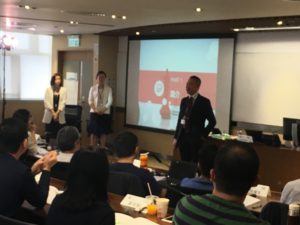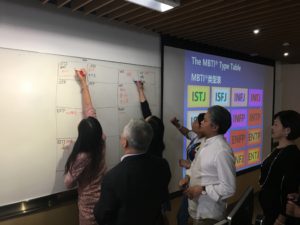How to understand yourself and the team with MBTI?
“Never think that you already know all. However highly you are appraised, always have the courage to say to yourself-I am ignorant.” – Ivan Pavlov
Leaders should have a strong self-recognition in a bid to manage oneself and the team effectively. On 15th April, A group of students had an evaluation in a vivid but serious manner.

Lawson Chu, A.PLUS Executive Consulting Director, is an all-rounded and experienced professional in strategic management, who will be the facilitator of MBTI.
Lawson firstly introduce the background of MBTI (Myers-Briggs Type Indicator), a self-reporting theory model for character analysis, to describe how people get information, and make decision, including psychology activity rules and character types towards life.
In terms of psychology, “character” refers to a behavioral tendency within the individual which consists of integrity, stability and structural model. Plus, it can explain one’s externalizing behaviors and attitude with consistent and in-depth findings.
In MBTI, there are 4 main dimensions and each of them includes 2 opposite preferences which 16 types of characters in total.
For example, “ISTJ” refers to “Introversion, Intuition, Thinking, Judgment). “ENFP” refers to “Extraversion, Intuition, Feeling, Perception”
Understanding myself
“What is my character type?” Lawson has invited all students to finish the professional test in order to know the personality traits.
The questions are quite difficult.


Lawson invited students to write down their own characters’ types.
In the interactive game session, Lawson invited different groups of students to demonstrate and play their roles.
All questions are interesting. For example: The company has finished a huge project, and provided a budget for colleagues to entertain for two days. If you were the boss, how to introduce and persuade colleagues about the plan?
The representatives of type “E” said, “We will pay 20 million dollars to go Macau. Just go for it regardless of the large expenses.”
The representatives of type “I” presented with a calm manner, “I need a detail-oriented report, including every single detail, like what, where and when we will go.”
Obviously, candidates with “E” type are good at communicating and expressing. On the other hand, candidates with “I” type are relatively introverted, thoughtful and sophisticated. In workplace, “E” type and “I” type has a higher ability in execution and reason respectively.
Students have fun because of the amazing role playing.
What can you see in the picture? Someone said, “I see an abstract painting.”, “I see a messy picture”, “I see the atomic bomb”, someone even said, “I can see LOVE in the picture!” (PIC12)
It is incredible for the difference among the candidates with “S” and “N” type, the former tends to get practical information and emphasize on details while the latter would put emphasis on imagination and uniqueness, concerning the general development and the change.
In terms of management, the leaders with “S” type would adopt practical action in down-to-earth manner, but they lack long-term strategies in planning. On the other hand, the leaders with “N” type are good at creating and suggesting long-term plan, it will cause the unrealistic result.
Therefore, appropriate coordination and adaption among colleagues with different characters can contribute to a successful long term development.
According to the result, there are 20 candidates in “I”type, 18 candidates in “E”type, 17 candidates in “S”type, 21 candidates in “N”type, 17 candidates in “F”type, 21 candidates in “T”type, 22 candidates in “J”type, 16 candidates in “T”type. In other words, “INTJ” is the most common type in class, we are good at suggesting innovation vision, method and system. Also, we are well-planned for the future development.
For the opposite type, candidates of “ESFP” should be careful!
Understanding the school life
In the afternoon session, Joey (City University of Hong Kong EMBA15) and Shirley (City University of Hong Kong EMBA16) have been invited to share their experiences about learning.
Joey expressed she was quite worried about whether she can handle with the program at first. Unexpectedly, she has been encouraged here and made a groups of friends with common interests. More importantly, she has developed a habit of running, from 1km to half marathon (~21km), and managed to finish the marathon in Hong Kong. Once she has finished the “Biz Challenge”, which she needed to walk over 120km in a harsh environment.
“I was regretted joining the (Biz) challenge, but I will join again in this year since it is a breakthrough and can help me to experience a different life!” Joey said.
Shirley shared once she had an outstanding job yet she lost the goal and happiness in it. Later on, she was determined to give up the start-up, and entered the EMBA program. The fact tells the wise decision, not only can Shirley develop a sophisticated start-up, but she can also gain a fruitful benefit in the program.
Mentors’ sharing were wonderful and won everyone’s high appreciation.

